Table of Contents
What is the role of blockchain in healthcare
Blockchain technology has many potential uses. It is one of the most talked about and yet least understood forms of new technology in recent years.
One reason it is difficult for companies to understand how they can benefit from Blockchain is the noise and hype surrounding it. As an investment asset class, it is risky and highly speculative. Although it has created a lot of wealth, there are many more who’ve lost money investing in Bitcoin and other cryptocurrencies.
And then in 2017, Initial Coin Offerings (ICOs) made numerous headlines around the world. Again, this looked – and in many cases was – like a highly speculative and risky way to make money. For many newbie investors, they will never see that money again. Regulating this industry is the only way to safeguard investors and protect company owners from scams and criminals, and the SEC in the U.S. and other regulators are looking into how to do this.
But as far as blockchain is concerned, none of that noise matters.

What is blockchain?
Blockchain is a way of securely replacing every organization seeing their own version of the truth. When business transactions take place, everyone has a record of that. Those records are stored internally. When everyone has their own version, this creates the potential for fraud and errors, costing billions.
Instead, with blockchain those records are maintained on a single, shared, tamper-evident digital ledger. Before a transaction or contract is agreed, every party needs to consent to it. Before payment can be made, parties need to confirm the terms of the agreement have been met. Every transaction on this ledger is stored and transmitted using cryptographic encryptions, making the blockchain more secure than other methods of transmitting and storing data. Transactions and records can’t be deleted, which means once something is recorded in a blockchain it is irreversible.
Blockchain is seen as a way of unlocking new value, streamlining existing processes and reducing risk. In the healthcare sector, there are many ways blockchain can be put to good use.
How blockchain applies to businesses
Blockchain technology is already being applied in numerous sectors. In financial services, for example, a global consortium of top-tier banks have formed R3, a technology partnership behind the Corda blockchain. Banks are actively looking to this technology as a way of improving international transfers, the settlement process and helping companies to execute smart contracts, to replace legacy methods.
It is estimated that blockchain can save the financial sector $35 billion annually in capital and operating expenses. Some of the many ways financial services can benefit from blockchain involve the transfer and storage of data. Banks generate a huge amount of data. So do healthcare companies, and in the same way, transferring it between organizations needs to be secure, accurate and verifiable. Healthcare and financial firms are faced with the same problem. Blockchain represents the answer.

4 reasons to apply blockchain in healthcare
1. Improved data sharing
A major challenge for healthcare providers, insurance companies and the big pharma industry is the sharing of data. Blockchain is designed to solve this problem.
Every organization is centered around the patient. Often, patient data needs to move between several organizations to manage the treatment process. And yet sharing this data proves difficult. Instead of the same records flowing seamlessly between organizations, each has its own records and the records of one don’t always match, even when referencing the same patient.
According to IBM, “Blockchain technology is a game-changer. Better data sharing between healthcare providers means a higher probability of accurate diagnoses, more effective treatments, and the overall increased ability of healthcare organizations to deliver cost-effective care.”
2. Data security
Security is a mission-critical issue in many industries. Healthcare records need to be accurate, verifiable and trusted when shared between organizations. Patient treatment and compliance requirements demand the utmost care is taken to ensure accuracy. With blockchain, every organization in the value chain would have access to the same records, without worrying about the accuracy or interoperability.
Akash Takyar from LeewayHertz claims:
3. Reduced overheads
Managing databases is expensive. Making them something that can be transferred and shared is even more expensive, as is bringing in data scientists to clean them, make sense of the data and create new value from databases.
All of those concerns almost disappear when data is shareable by design. Shared decentralised databases are more cost-effective, more accurate and easier to manage.
4. Unlock new value
When data sits in silos and is difficult to transfer, it costs money. Probably more than most people realise. IBM estimates that in the U.S. alone, the cost of bad data – messy, inaccurate, unclean – is $3.1 trillion.
In practice, this is what bad data looks like within large organizations: “Salespeople waste time dealing with erred prospect data; service delivery people waste time correcting flawed customer orders received from sales. Data scientists spend an inordinate amount of time cleaning data; IT expends enormous effort lining up systems that “don’t talk.” Senior executives hedge their plans because they don’t trust the numbers from finance.”
Not only can blockchain solutions eliminate these problems, but they can also be used to unlock new value. With accurate data sharing, pharma and healthcare companies can create new products and services that improve patient outcomes. New drugs, new technology, and services can implement preventative and reactive healthcare, and monitor patients after treatment, providing companies are sharing the most accurate and easily transferred version of the data.
Let’s take a look at how blockchain technology in healthcare is already being applied in practice.
10 Healthcare Blockchain Startups to Watch
#1: Nebula Genomics
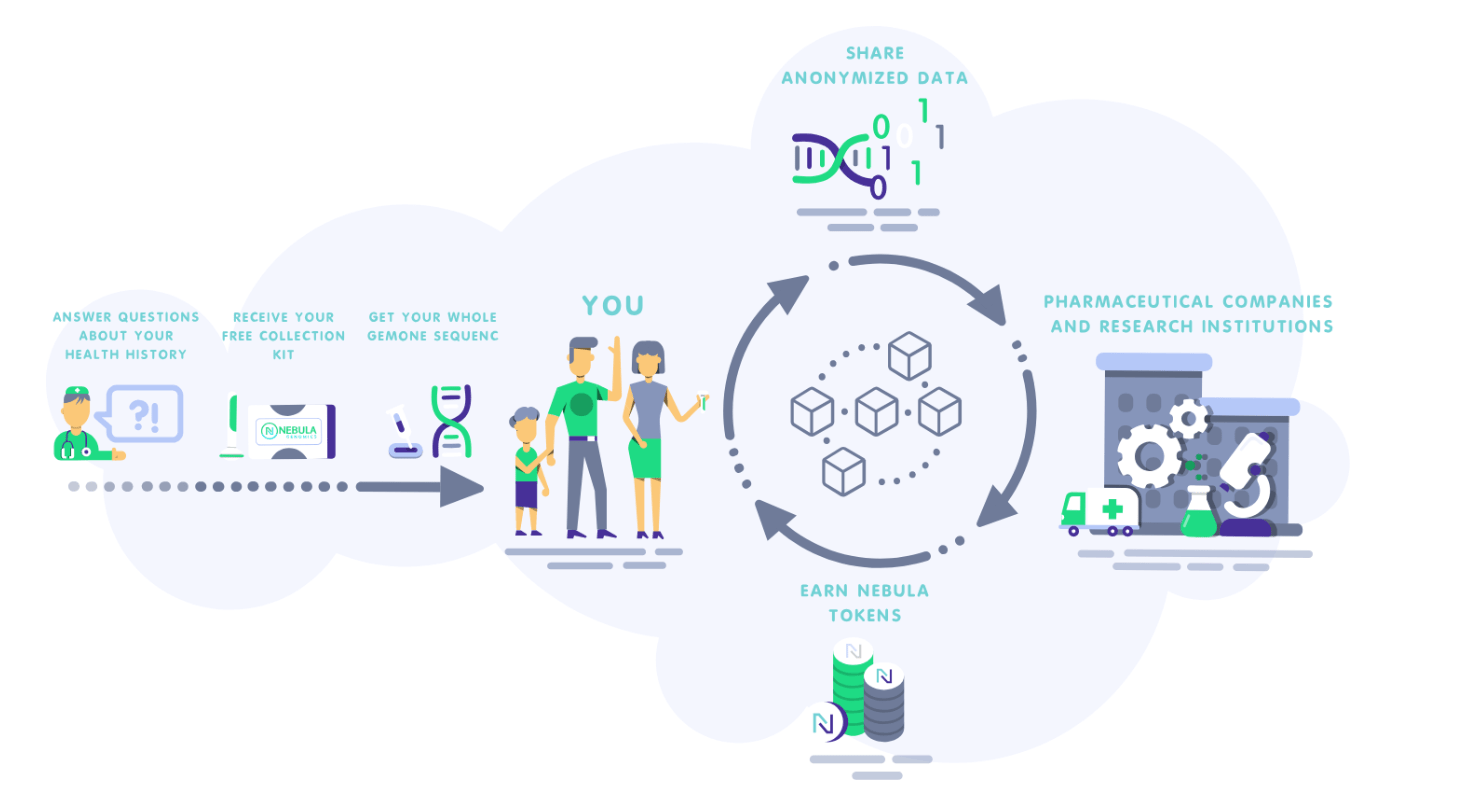
Website: https://www.nebula.org/
Founded: 2017
Location: San Francisco & Boston, USA
Founded by Professor George Church, the “Father of synthetic biology”, a Professor at Harvard Medical School and MIT, and the inventor of next-gen DNA sequencing.
Nebula Genomics gives consumers the ability to understand and sequence their entire DNA. It runs on blockchain technology to maintain higher levels of security than other gene sequencing companies. In 2018, it raised $4.3 million from leading VC firms, including Khosla Ventures.
Nebula is contributing towards humanities broader health goals: “A common connection we all have is that someone we know has faced a disease like Cancer, Alzheimer’s, ALS and so many others. By signing up with Nebula, you have the ability to directly contribute to a community dedicated to conducting transformative research, finding new treatment options, and discovering potential cures.”
#2: Doc.ai

Website: https://Doc.AI
Founded: 2016
Location: California, USA
Doc.ai is a “blockchain-based, AI-powered and omics-data-centric” company, giving consumers the ability to securely record their health and maintain those records in the blockchain. With over 3 million people using this every day, the AI behind it helps people and doctors make smarter medical choices and lifestyle improvements.
#3: Iryo

Website: https://iryo.io/
Founded: 2017
Location: Global
Iryo is on a mission to “redefine global healthcare.” It is going to do this by creating globally interoperable medical data with openEHR archetypes, which means patients can take their data with them. It also means that doctors and medical providers can share data more easily through a healthcare public blockchain that they are building.
#4: Patientory

Website: https://patientory.com/
Founded: 2015
Location: Atlanta, USA
Also built on the blockchain, Patientory is an easy way to securely store and manage health information in real time, giving consumers control of their medical data. Anyone who wants a more accurate real-time view of their health can download an app, and if they want, this information can be shared with healthcare providers and doctors.
Patientory is the “the leading provider of dApp blockchain solutions for healthcare.”
#5: Chronicled
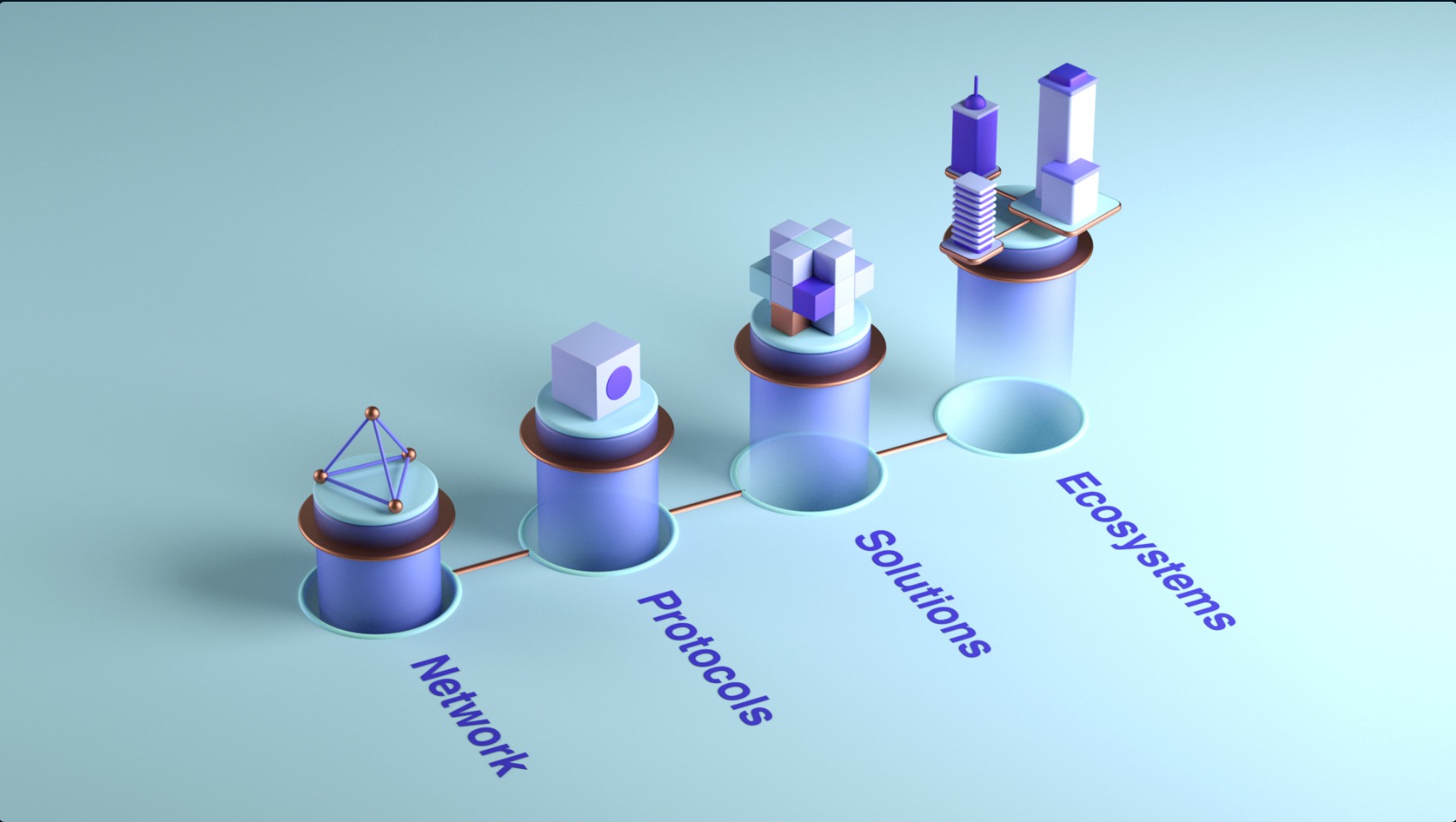
Website: https://www.chronicled.com/
Founded: 2014
Location: San Francisco, USA
Chronicled is focused on “driving the future of enterprise supply chains.” Taking blockchain forward to its natural conclusions, Chronicled wants to “Imagine a world where trust between enterprises is never in doubt. Imagine entire supply chains that circle the globe and yet are always completely secure for the customers they serve, wherever they may be.”
One of the ways they are doing this is in healthcare. Although they serve many sectors, with solutions for a wide range of industries, the underlying technology stack and principles remain the same. In healthcare, they’re working with pharma companies to create an open and decentralised, yet secure, pharma network.
Known as the MediLedger Project, it was started in 2017 to “bring together leading Pharmaceutical Manufacturers and Distributors to explore blockchain technology to meet track and trace regulations, and to provide a step function improvement in the overall operation of the supply chain.”
#6: Coral Health
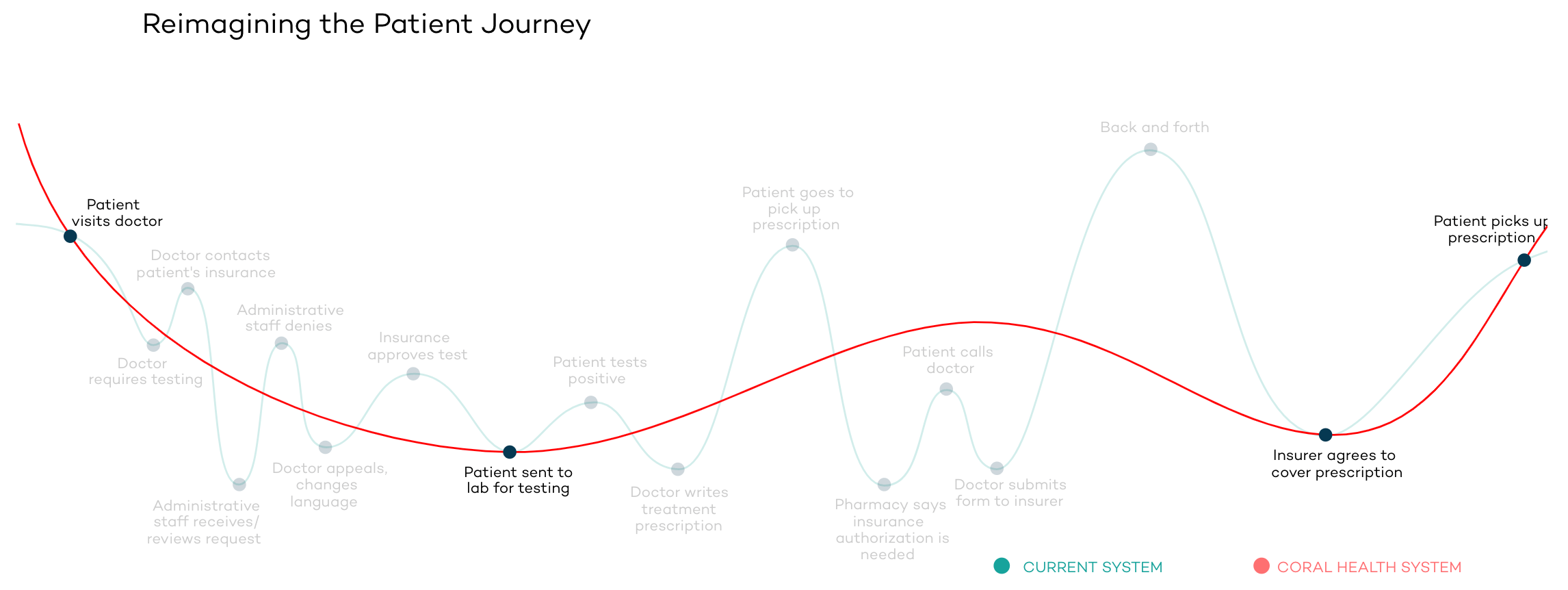
Website: https://mycoralhealth.com/
Founded: 2018
Location: Boston, USA & Vancouver, Canada
Coral is combining a personal health app (web, iOS, Android) and a decentralised blockchain-based network to create Coral Health Records, that provides consumers and patients with secure, seamless control over their full health history.
Using Blockchain, Coral can create health solutions that serve the needs of the whole industry: patients, providers and labs, payers, the life sciences industry and public health organisations. Records are secure and compliant with medical and consumer data regulations and laws in North America and Europe.
#7: PokitDok
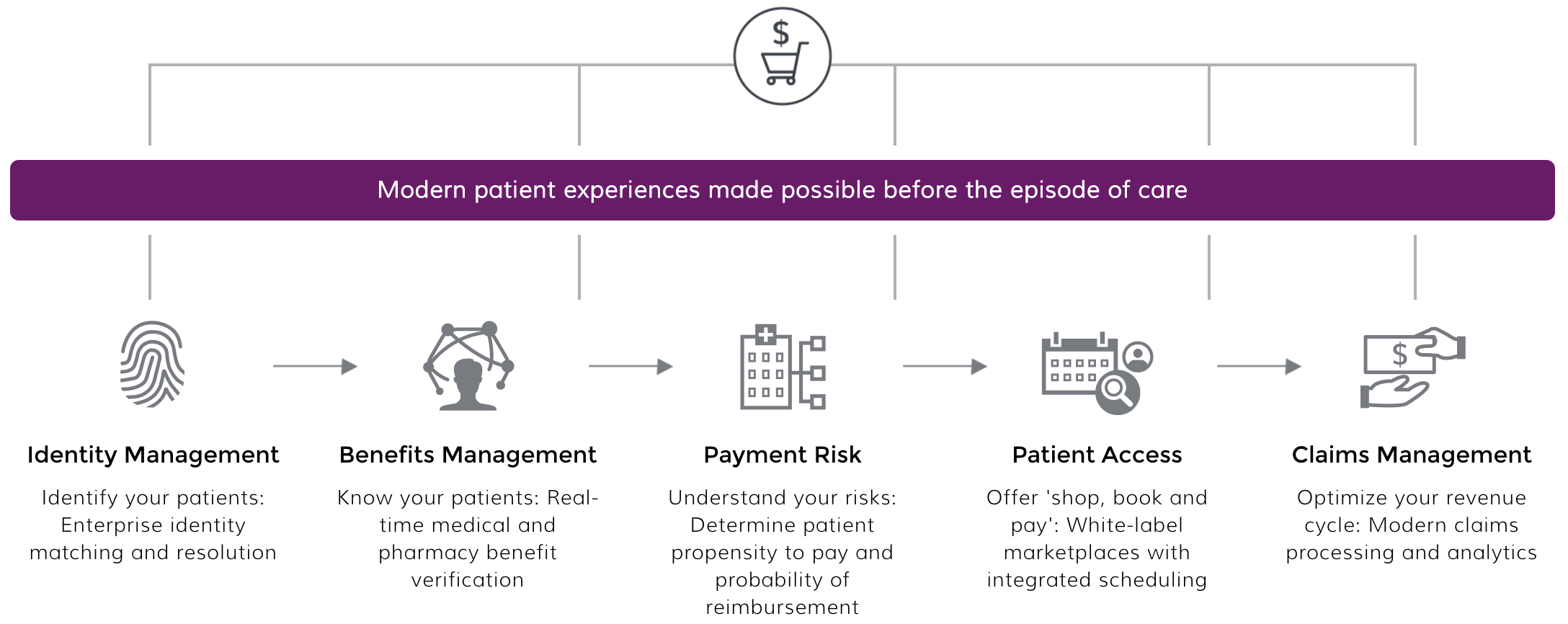
Website: https://pokitdok.com/
Founded: 2011
Location: South Carolina, USA
PokitDok is one of the most established players in this space, working with 700 vendors in the healthcare insurance space, which means they have access to 93% of all insured patients in the U.S. PokitDok offers a platform-as-a-service to clients, making it faster and easier for healthcare organizations to bring new applications and services to market.
With the PokitDok system, it is easier to access medical data and information at scale and even manage and improve patient experiences before they need healthcare treatment. They are trusted, certified and secure and have been using blockchain to improve the level of security and encryption layers on their platform.
#8: Hashed Health

Website: https://hashedhealth.com/
Founded: 2016
Location: Tennessee, USA
Hashed Health provides value-added services such as network product management, product development, regulatory guidance and technology support services for blockchain networks.
#9: GEM
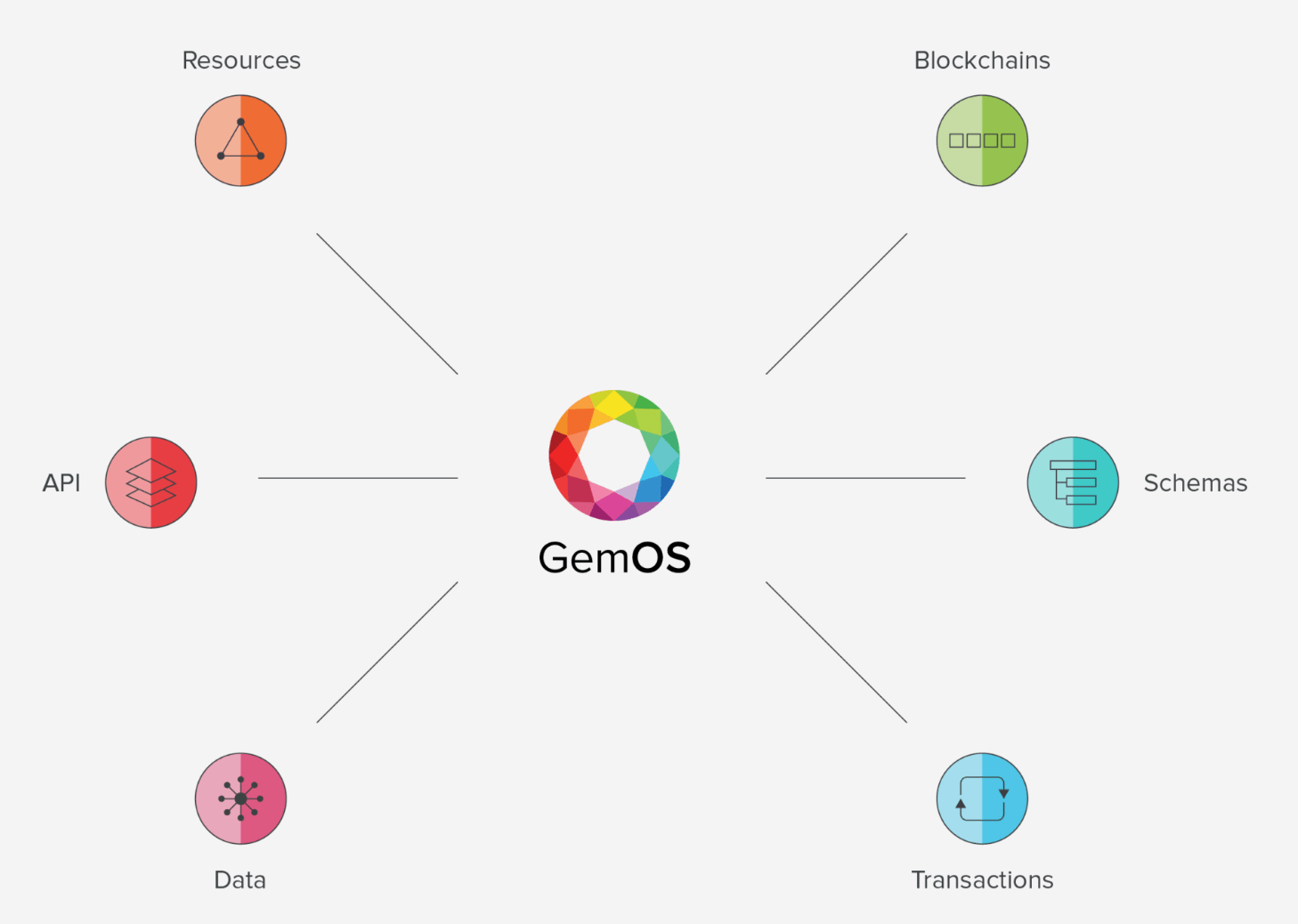
Website: https://enterprise.gem.co/
Founded: 2013
Location: LA, USA & Europe
Gem is a healthcare startup that is already working with a global giant such as Philip’s to explore “how blockchain technology can support a patient-centric approach to healthcare.” With a blockchain-based operating system already running, GemOS, they can work with partners on industry-driven solutions that align with their goals and patient needs, then develop a tailored solution around those challenges.
#10: ALLIVE

Website: https://allive.io/
Founded: 2017
Location: China & USA
Within the ALLIVE ecosystem are three active technology solutions built on blockchain: OLIFE (an encrypted, comprehensive, and self-perfecting health profile); OLIVIA (an AI doctor by formulating a medical knowledge graph with machine learning algorithms) and OLEAF (completes a closed loop of healthy lifestyle by integrating full-process healthcare services through modular interfaces).
ALLIVE is aiming to support the complete patient lifecycle, built on the blockchain with AI technology to interface with patients.
As we can see, blockchain is already playing an important role in the healthcare ecosystem. As more companies explore this technology and work with innovative startups, new solutions will emerge. Some with thrive. Others will vanish. But the work that goes into creating these solutions will power new treatments, new patient processes, and improved outcomes.






